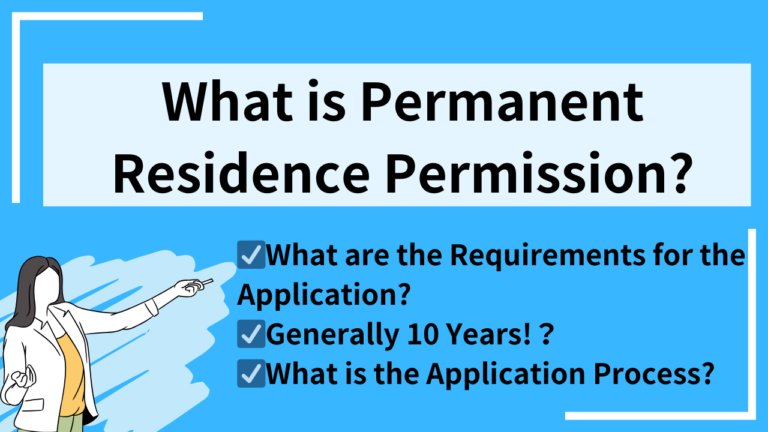For foreigners who wish to live in Japan long-term, obtaining permanent residency is a significant goal. Achieving permanent residency removes restrictions on your stay period and activities, allowing you to enjoy life in Japan with greater freedom (though you will still need to renew your residence card). However, meeting strict requirements is necessary to obtain it. This article provides a detailed explanation of important points and requirements related to obtaining permanent residency.
 Utsunomiya
Utsunomiya・Those who want to learn about applying for permanent residency in Japan
・Those who are considering applying for permanent residency
・Those who want to understand the requirements for applying for permanent residency
- 1 Basic Overview of Permanent Residence
- 2 Requirements for Obtaining Permanent Residence
- 3 Special Provisions and Requirements for Permanent Residence
- 4 Process for Applying for Permanent Residence
- 5 Key Points for Applying for Permanent Residence
- 6 In Conclusion
- 7 About Trust Administrative Scrivener Office
- 8 Contact
Basic Overview of Permanent Residence
Permanent residence refers to obtaining the residency status of “Permanent Resident” in Japan with the permission of the Minister of Justice. By receiving this permission, foreigners can live in Japan indefinitely without changing their nationality. Unlike other residency statuses, permanent residents do not face restrictions on their activities or duration of stay, allowing them to enjoy a more stable and unrestricted life in Japan.
Requirements for Obtaining Permanent Residence
To obtain permanent residence, applicants must meet the following three main requirements. These criteria are used to evaluate a stable life and social contribution in Japan and are scrutinized carefully.
1. Good Conduct
Applicants for permanent residence must demonstrate that they adhere to laws and social norms in their daily lives and have not engaged in behavior that would be criticized by other residents. Specifically, the following aspects are considered:
- Criminal Record: It is essential to have no significant criminal history. If an applicant has received criminal penalties in the past, the nature and circumstances of these penalties may impact the ability to obtain permanent residence. Even minor infractions, if repeated, can be problematic.
- Adherence to Social Rules: Payment of taxes and social insurance contributions is also evaluated. Unpaid or delayed payments may be seen as evidence of poor conduct. Additionally, everyday behaviors such as traffic violations or actions that disrupt public order are assessed.
- Social Credibility: Relationships with the local community and involvement in volunteer activities or other forms of social contribution are considered. Being well-integrated into Japanese society and maintaining good relationships can serve as evidence of good conduct.
2. Possession of Assets or Skills Sufficient for Financial Independence
A crucial requirement for obtaining permanent residence is that the applicant must be able to maintain a stable life in Japan independently. This criterion assesses whether the applicant can support themselves without becoming a public burden, based on their assets or skills.
- Stable Income: Applicants must have a stable source of income. This includes salary from an employer or, for self-employed individuals, revenue from their business. If the applicant has dependents, the total family income must be sufficient to support all family members.
- Savings and Assets: In addition to income, savings and assets are evaluated. For example, having adequate savings to cover unforeseen circumstances is considered an important factor for maintaining a stable life. Real estate and other assets also contribute to the assessment.
- Skills and Occupational Stability: Holding specific skills or qualifications that ensure stable employment can be advantageous. Especially if the applicant is in a profession requiring skills that are in demand in Japan, these skills can positively influence the chances of obtaining permanent residence.
3. Being Recognized as Beneficial to Japan
To obtain permanent residence, the applicant must be recognized as being beneficial to Japan. This requirement is assessed based on the length of stay in Japan, the activities conducted during this time, and other comprehensive factors.
- Length of Stay: Generally, the applicant is required to have resided in Japan for at least 10 years. It is particularly important that the applicant has held a work visa or residency status for at least 5 years within that period.
- Social Contribution and Adaptability: The applicant’s contribution to and adaptability within Japanese society are also evaluated. Active participation in the local community, cultural integration, and contributions to Japan’s economy or society can be viewed positively and help demonstrate that the applicant’s permanent residence aligns with Japan’s interests.
- Special Circumstances: Special circumstances can also influence this requirement. For example, having a Japanese spouse or child, or contributing to Japan with specific skills or knowledge, may work in the applicant’s favor.
Special Provisions and Requirements for Permanent Residence
While the basic requirements for obtaining permanent residence are stringent, there are special provisions that may relax some of these requirements under certain conditions. Below are the main provisions and their detailed requirements:
1. For Spouses and Children of Japanese Nationals
For spouses or children of Japanese nationals, permanent residents, or special permanent residents, the requirements for permanent residence may be relaxed under special provisions.
- Marriage Duration: For spouses of Japanese nationals or permanent residents, the marriage must have been genuine and continuous for at least 3 years. The term “genuine” means that the marriage is not merely formal but involves actual cohabitation and is recognized socially.
- Duration of Stay: Additionally, the applicant must have been continuously residing in Japan for at least 1 year. This assesses their adaptation to Japanese society and whether they are leading a stable life.
- For Children: If the applicant is a child of a Japanese national or permanent resident, they must have been continuously residing in Japan for at least 1 year. For children, adaptation to the educational and living environment is emphasized, with a focus on their stable growth in Japan.
2. For Holders of the “Long-Term Resident” Status
For those holding the “Long-Term Resident” status, the requirements for permanent residence may be relaxed compared to other residency statuses.
- Duration of Stay: It is required to have been continuously residing in Japan for at least 5 years as a “Long-Term Resident.” The “Long-Term Resident” status is granted by special permission from the Minister of Justice, indicating a stable life in Japan, which can be advantageous in the permanent residence application process.
- Social Adaptation and Contribution: How the applicant has adapted to and contributed to Japanese society during their time as a “Long-Term Resident” is also a significant criterion. This includes factors such as holding a stable job and actively participating in the local community.
3. For Recognized Refugees
For those recognized as refugees in Japan, the requirements for permanent residence may be relaxed as a special exception.
- Duration of Stay: It is required to have been continuously residing in Japan for at least 5 years after being recognized as a refugee. Refugees often have their permanent residence granted due to their inability to return to their home country because of special circumstances.
- Protection and Adaptation: The assessment includes how the applicant has lived and adapted to Japanese society after being recognized as a refugee. This consideration includes whether they have received job training, are employed, and have established good relations within the local community.
4. For Highly Skilled Foreign Professionals
Foreigners with advanced skills or knowledge who are deemed to significantly contribute to Japan’s economy or technological development may have relaxed requirements for permanent residence.
- Duration of Stay: It is required to have continuously resided in Japan for at least 3 years as a highly skilled foreign professional. Unlike the standard requirement of 10 years, highly skilled professionals may benefit from a special exception allowing for permanent residence in a shorter period.
- Points System: The condition includes obtaining at least 70 points under the points system established by the Immigration Services Agency. Points are awarded based on factors such as education, work experience, income, age, and research achievements. A score of 80 points or more can further shorten the required duration of stay.
- Contribution to Japan: The applicant’s activities and contributions to Japan are also important factors in the assessment. Significant achievements in Japan’s technological innovation or economic growth can make it easier to obtain permanent residence.
Process for Applying for Permanent Residence
The application for permanent residence involves many procedures and preparations. Following these steps can help ensure a smooth process.
1. Prepare Required Documents
Applying for permanent residence requires a variety of documents. The basic documents include a passport, residence card, certificate of residence, tax certificates, and income certificates. Depending on the applicant’s living situation and occupation, additional documents may be needed. For example, an employee may need a certificate of employment and salary statements, while a self-employed person may need a tax return. Ensure all documents are up-to-date and complete by creating a checklist in advance. If you are unsure about document preparation, consulting with a professional such as an administrative scrivener can be helpful. Our office is also available for consultations, so feel free to contact us.
2.Submit Application to the Immigration Bureau
Once the required documents are gathered, the next step is to submit the application form to the Immigration Bureau of the Ministry of Justice. This submission generally needs to be done by the applicant themselves, but it is also possible to hire a professional, such as an administrative scrivener, to handle it. It is crucial to carefully check that all submitted documents are accurate and complete. Any errors or omissions could delay the review process, so proceed with caution.
3. Commencement of Review
Once the application is accepted, the review process begins. During this review, the submitted documents are carefully examined to determine whether the applicant meets the requirements for permanent residence. The review focuses on aspects such as tax payment status, social insurance contributions, income stability, and any past criminal or violation records. Additionally, the applicant’s living conditions in Japan and their contributions to the local community may also be taken into account.
4. Submission of Additional Documents
During the review process, you may be required to submit additional documents. This can occur if the initial documents submitted were insufficient or if more detailed information is needed. There is often a deadline for submitting these additional documents, so it is crucial to respond promptly. Delays in submission can result in further delays in the review process, so it is important to be attentive and timely.
5. Notification of Approval or Denial
Once the final review is complete, you will receive a notification of either approval or denial. If approved, a new residence card will be issued, granting you the status of “Permanent Resident”. This status does not require renewal, allowing you to continue living in Japan stably. If denied, the reasons for the denial may be provided, and if you disagree, you can consider reapplying or filing an appeal.
6. Life as a Permanent Resident
After receiving permanent residence status, you will no longer face specific restrictions in your life in Japan. For instance, the renewal procedures for your residence status are no longer required, and employment restrictions are relaxed, allowing you to pursue a wider range of job opportunities. Additionally, as a permanent resident, you will gain increased social trust, making it easier to obtain a mortgage and access various services.
Key Points for Applying for Permanent Residence
When applying for permanent residence, it’s crucial to pay attention to several key points. Here’s a summary of what to be particularly mindful of:
Check Cases Where the Required Residency Duration in Japan May Be Reduced
First, verify whether there are any special provisions that might allow for a reduction in the required number of years residing in Japan. Depending on your current residency status and your past duration of stay in Japan, there may be cases where the required duration is shortened. It’s important to confirm whether you qualify for any of these exceptions.
Select a Reliable Guarantor
When applying for permanent residence, you need to choose a guarantor. Unlike a general joint guarantor, this person does not have a legal obligation. Therefore, it is essential to explain this distinction clearly to the prospective guarantor and ensure they understand and agree to the role.
Plan Your Application Timing
When applying for permanent residence, it is crucial to submit your application before your current residency status expires. The review process for permanent residence typically takes about 4 months, so you should prepare well in advance. If your residency status is nearing expiration during the application process, be sure to complete the renewal procedures without delay.
Understand the Risks of Permanent Residence Revocation
Even after permanent residence is granted, there are certain conditions under which it can be revoked. For example, if you leave Japan without obtaining re-entry permission or if you do not re-enter Japan within one year of leaving under a deemed re-entry permit, your status may be at risk. Additionally, engaging in illegal activities or violations (such as not reporting your address, false address reports, or serious crimes) can lead to revocation of your status. Always comply with the law and ensure that you follow appropriate procedures to maintain your permanent residence.
Preparation to Avoid Denial
In the event that your permanent residence application is denied, you can reapply. However, merely repeating the application without addressing the underlying issues is likely to yield the same result. Thoroughly review the requirements and required documents from the beginning and ensure that your application is meticulously prepared. If you have concerns about the application process, consult with an administrative scrivener in advance to receive professional advice and guidance.
In Conclusion
Obtaining permanent residence in Japan offers many benefits for foreigners considering long-term living in the country. With permanent residence, you no longer need to renew your residency status, providing a stable living foundation and enhancing your social credibility. Additionally, it opens up opportunities for bringing family members, purchasing property, and enjoying a more free and enriched life in Japan.
However, achieving permanent residence requires meeting stringent requirements. Key among these are maintaining good conduct, having the ability to support yourself independently, and contributing to Japan’s interests. To meet these requirements, you must maintain a stable life in Japan over an extended period and contribute positively to society. It is also essential to follow the law and build good relationships with the local community.
I hope this article provides valuable information for those aiming to obtain permanent residence and assists in your future preparations. Securing permanent residence can be a significant milestone for both individuals and their families, so it is important to plan carefully and proceed with the necessary procedures.
If you have concerns or questions about the permanent residence application or need professional advice, please feel free to consult us.
About Trust Administrative Scrivener Office
Trust Administrative Scrivener Office is located in Kokura Kita Ward, Kitakyushu City, and specializes in supporting permanent residence applications and other residency status procedures. We are committed to staying updated with the latest information and providing personalized, meticulous services tailored to each client.
Our Services Include:
- Support for Permanent Residence Applications
- Procedures for Changing and Renewing Residency Status
- Assistance with Naturalization Applications
- General Visa Consultation
Our mission is to offer trustworthy and reliable services, ensuring that our clients can live in Japan with confidence. We provide free initial consultations, so please don’t hesitate to reach out to us for assistance.
We are dedicated to supporting your life in Japan and helping you live comfortably and securely. Please feel free to contact us for any inquiries.
Contact
Our office offers online consultations and on-site visits. We also strive to respond to emails and LINE messages as much as possible, even on non-business days. Please feel free to contact us using your preferred method. You can send us a message directly using the buttons below.









